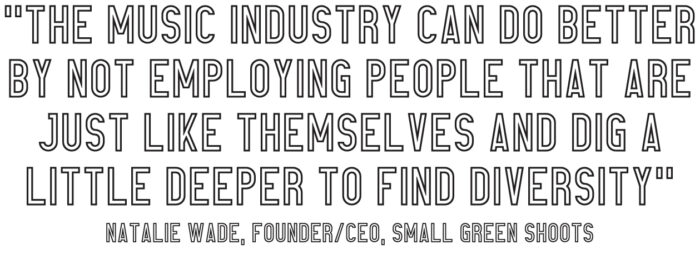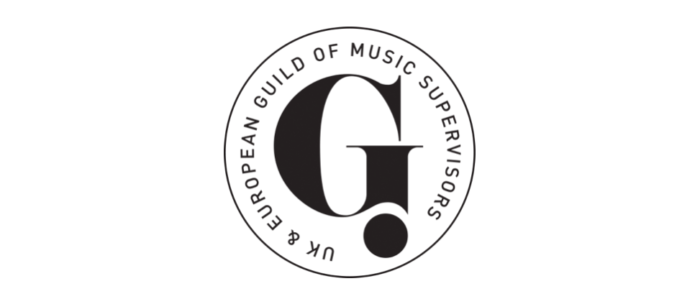The GMS recognises the existing diversity gap in our sector and the part we can all play in affecting change. Our new interview series will highlight organisations and communities that enable greater inclusion and access in our industry.
Through our conversations we will reflect on some of the barriers to our sector, highlight existing career-access programmes, thus encouraging new initiatives and partnerships to create lasting impact. We hope that these conversations will inspire, educate and provide a catalyst for new collaborations to work towards greater inclusion and representation in our Supervision / Sync sectors, as well as the sectors with which we intersect.

For our first spotlight in the series, we speak to Natalie Wade, CEO and Founder of Small Green Shoots, the hugely impactful organisation offering unique career-entry programmes and opportunities in the entertainment and creative industries. Notoriously difficult to infiltrate, the barriers to the music industry become near-on impenetrable for young people facing difficult life circumstances.
Natalie concurs; “The industry tends to employ people they know, employ within their own network and connections and the only way to get in is often through being a part of the social scene or through unpaid work experience. You’re also expected to be confident and out-going and a lot of young people I worked with aren’t privileged. They don’t feel entitled, and this often means they don’t feel confident enough to put themselves forward. At Small Green Shoots we give them responsibilities to help them realise their potential and help grow their own confidence.”
One of Natalie’s main motivations for founding Small Green Shoots was “[the] lack of diversity in executive positions within the music / entertainment industry.
“Where I grew up [there were] loads of people passionate about music but no one had connections… I wanted to level the playing field.”
Small Green Shoots helps and supports young people (the “Shoots”) by offering an alternative to the conventional system for education, training and entry in to these industries. The programmes involve paid classroom learning, vocational training, internships and access to creative grants, allowing the Shoots to build a career as opposed to just seeking a job.
One of the current Shoots, Erin, gives her own perspective on how this practical experience has supported her personal development, as well as the importance of SGS as an organisation: “Small Green Shoots has been key to my professional development but more importantly integral to helping me to navigate the start of my career. I started at SGS with little to no confidence in myself and where I was going after graduating from university. From my first day at SGS, I have been learning through doing which is something that university could not offer me… There is truly no other place like SGS, it needs to be supported and protected if we are to help more people like myself to figure life out.”
Not only is this an opportunity for the young people, but an opportunity for our music and creative businesses to diversify our workforce and benefit from a wider pool of talent. For Natalie, this means digging deeper to open up hiring practices: “The music industry can do better by NOT employing people that are just like themselves and dig a little deeper to find diversity. Not just in income, race or culture but personality. There are a lot of extremely skilled young people out there and once you spend the time getting to know them you will notice this.”
Despite the obstacles that currently exist, there are impactful means of countering some of the barriers from within the industry. In Natalie’s view, practical experience goes a long way. “Secondments are vital as the young people get to understand a different working environment, and how departments within organisations work alongside each other. They learn how to perform in different environments and also get the chance to develop their own network. It also gives employers and line managers a chance to get to know the young people beyond an interview and CV.”

Lorita spent her secondment on a TV series with Leland Music: “I asked myself a question many people in my position have asked themselves: how do I become / learn to become a music supervisor if I’m not equipped enough to have a job as a music supervisor? There are no music supervision courses I can take, so what’s the next step? And that’s where secondments like these take their place. Having an opportunity like this with a company like Leland Music is one-in-a-million. It will allow me to gain all the skills I need to become a full-time music supervisor with firsthand experience. It will bring me one step closer to achieving my dream job. I can’t thank Small Green Shoots and Leland Music enough for creating the space for more secondments and work placements in this industry.”
Moreover, following an initial three month internship at Concord, young Shoot Amber is now staying on for a further six months. Amber said about her time: “Working alongside Concord has been a great experience for me. Not only is it such a supportive environment, but I’ve also gained so much knowledge into the publishing side of music [and] what happens behind the scenes within sync… Small Green Shoots has also been offering extra support and checking in on me and my progress which I really appreciate.”
Sara Lord (Concord): “I could go on for hours about how great Small Green Shoots are. Suffice to say that Natalie and the team there provide an incredible service, not only to us, the companies who are looking for interns, but more importantly to their Shoots – young people who want to get into the creative industries. Natalie paired us with Amber… she is so amazing, I’m sure she will be running the show one day very soon.”
What You Can Do
There are several ways that you can help to support Small Green Shoots and provide opportunities for young people. In addition to secondments, you can sponsor a Shoot through the Young Shoots Programme and also offer shadowing opportunities. If you just want to chat through an idea or see how it might work for your organisation, please reach out to diversityandinclusion@guildofmusicsupervisors.co.uk.
The UK and European Guild of Music Supervisors

